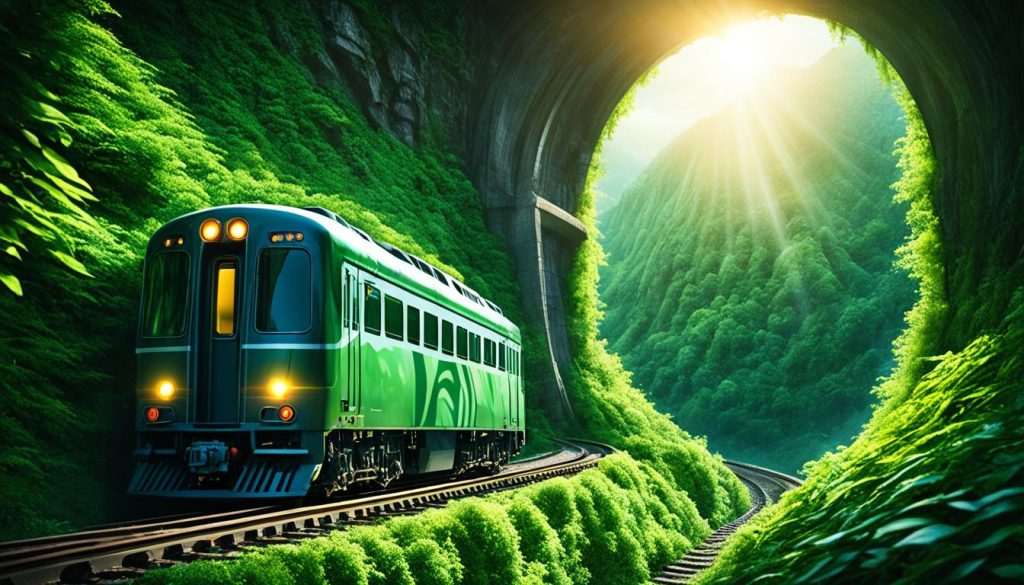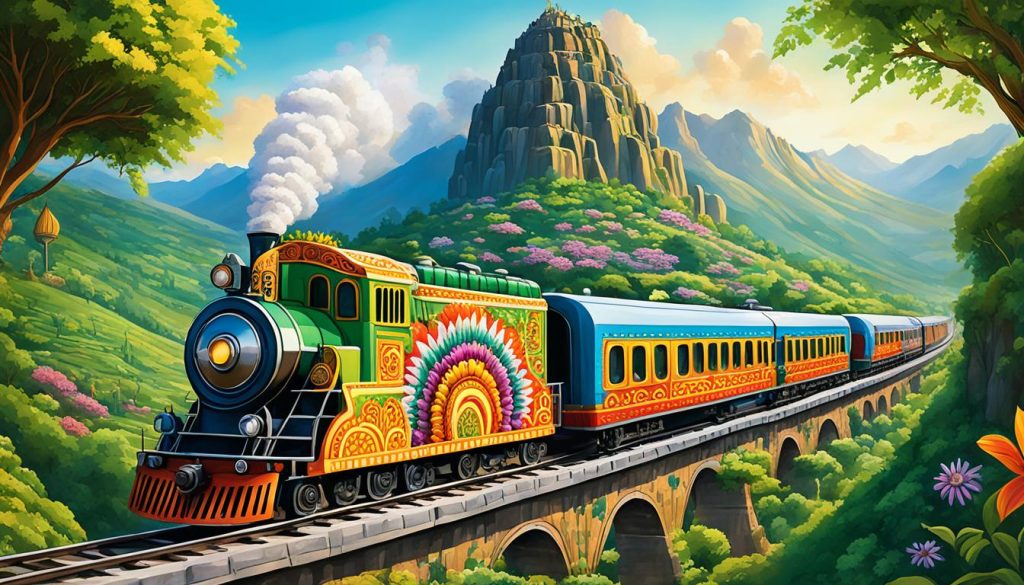Have you ever wondered why trains hold such a deep spiritual meaning? What is the symbolic significance of trains in personal growth and dreams? Explore the mystical world of train symbolism and uncover the spiritual journey they represent.
Key Takeaways:
- Trains symbolize the journey of life, personal growth, and the soul’s path in spirituality.
- Encountering a train can signify an upcoming spiritual journey or a significant shift in life direction.
- Trains hold significant spiritual significance in religious and philosophical contexts.
- They symbolize progress, adventure, and societal changes in literature and art.
- Trains represent strength, determination, resilience, and connections in personal growth.
The Spiritual Significance of Trains
Trains hold significant spiritual significance, both in religious and philosophical contexts. They symbolize the journey of life, personal growth, and transformation. Trains have been used as symbols of progress, adventure, and societal changes in literature and art throughout history.
Trains represent the passage of time and the interconnectedness of human experiences. They embody the idea that life is not a static state but a constant movement, urging individuals to embrace change and seek personal evolution. Just as a train moves along its tracks, people are encouraged to navigate their own paths in life, facing challenges, and overcoming obstacles.
Train symbolism is prevalent in literature, where authors use the imagery of trains to convey deeper meanings. In many literary works, trains represent not only physical journeys but also spiritual quests, inner exploration, and self-discovery. They serve as metaphors for personal growth and the pursuit of truth.
“The train symbolizes the spiritual journey one undertakes in search of enlightenment, with each station representing a milestone on the path to self-realization.” – Famous Author
In the realm of art, trains have inspired artists to capture their essence and symbolism on canvas and in sculptures. Through different artistic mediums, artists explore the themes of movement, transition, and the human experience. Trains evoke emotions and provoke contemplation, inviting viewers to reflect on their own spiritual connections, and the significance of life’s journey.
Train Symbolism in Different Cultures
The symbolism of trains varies across different cultures, reflecting their universal significance in spiritual and metaphorical interpretations. In some cultures, trains symbolize connection and unity, representing the bridging of distances and bringing people together. In others, trains represent the cyclical nature of life and the interconnectedness of all beings.
“In Eastern philosophy, trains are seen as vehicles that carry souls to the afterlife, symbolizing the transition from life to death and the soul’s journey towards enlightenment.” – Spiritual Scholar
Regardless of cultural differences, the symbolism of trains highlights their role as powerful symbols of growth, change, and spiritual evolution. Their universal significance resonates with individuals across the world, inviting them to embark on their own spiritual journeys and explore the depths of their souls.
Train Symbolism in Personal Growth
Trains hold a profound spiritual connection, serving as potent symbols in personal growth and spiritual development. They embody essential qualities like strength, determination, and resilience, reminding individuals to face life’s challenges with unwavering resolve. The rhythmic movement of trains mirrors the rhythms and cycles of life, urging us to stay attuned to our personal and universal rhythms.
Trains also symbolize connections and relationships, highlighting the importance of examining our connections and their impact on our spiritual journey. Just as trains rely on a network of tracks and connections, our spiritual growth is intertwined with the people and experiences we encounter along the way. The symbolic interpretation of trains emphasizes the significance of progress, urging us to let go of the past and embrace new opportunities and experiences.
“Trains are vehicles that carry us through the journey of personal growth and spiritual transformation. They remind us to stay resilient and embrace the interconnectedness of our experiences.” – Spiritual Guru
Like a train’s steady movement forward, personal growth requires continuous progress. It encourages us to leave behind what no longer serves us, making room for new possibilities and personal evolution. Trains symbolize the journey of life, with each stop representing a learning opportunity and a chance to redefine ourselves.
The Symbolic Interpretation of Trains
The symbolic interpretation of trains goes beyond their literal existence. Trains serve as metaphors for our spiritual journey, guiding us towards self-discovery and enlightenment. They represent the transformative power of movement and change. Just as trains navigate diverse landscapes and reach new destinations, we too can navigate life’s complexities and strive towards personal growth.
Trains also teach us to find harmony between individual progression and collective experiences. While we embark on our personal journeys, we remain connected to the shared human experience. The rhythm of a train’s motion illustrates the interconnectedness of our lives, reminding us to consider the impact of our actions on others.

Trains in Different Cultures
Trains have long captivated different cultures around the world, each imbuing them with their unique symbolic meanings and interpretations. Let’s explore the train symbolism in various cultures and the spiritual significance they hold.

Symbol of Connection and Unity
In many cultures, trains symbolize the unifying force that brings people together. They represent the ability to bridge distances, both physical and metaphorical. The railway networks that connect cities and countries act as conduits of unity, fostering cultural exchange, trade, and shared experiences.
“Trains are the threads that weave our communities together, providing a vital link that transcends borders and connects hearts.”
Vehicles for Transition and Transformation
In numerous spiritual traditions, trains are seen as powerful vehicles for transition and transformation. They symbolize the journey from life to death and the passage of the soul to the afterlife. The rhythmic movement of trains echoes the cycles of life and serves as a reminder of the constant state of flux we all experience.
Universal Themes of Spiritual Connection and Progress
While train symbolism may vary across cultures, certain universal themes emerge. Trains consistently represent the spiritual connection between individuals and the world around them. They signify the human desire for progress and the pursuit of personal growth. Whether in India, Japan, or the United States, trains continue to resonate as potent symbols of spiritual and metaphorical significance.
The Train Whistle’s Spiritual Significance
The train whistle holds profound spiritual significance, representing much more than a mere sound. It is often perceived as a symbol of transcendence and a connection to the divine. The distinct and powerful sound of the train whistle carries a rich history and unique meaning that resonates deeply with individuals.
Originally, the train whistle served a practical purpose, functioning as an essential tool for communication and safety during the early days of train travel. However, over time, people began to attribute a deeper significance to the haunting sound it produced. The train whistle’s resonance became synonymous with hope, unity, and a spiritual connection.
Many individuals believe that the train whistle holds spiritual symbolism, signifying the presence of departed loved ones and offering guidance and peace in challenging times. Its evocative sound can evoke a sense of nostalgia and serve as a comforting reminder of the interconnectedness of life and the journey of the soul.
In spirituality, the train whistle is regarded as a powerful symbol of transition and transformation. Its haunting sound invites individuals to embrace change, let go of the past, and embark on new paths. It serves as a reminder to stay attuned to one’s personal and universal rhythms, fostering growth, resilience, and a deepening connection with the divine.







